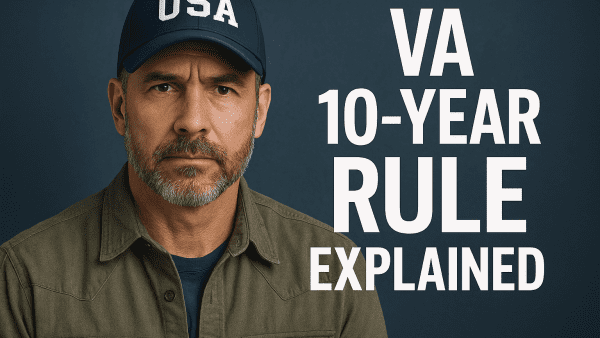Looking for Expert-Level VA Claim Answers?📱Call Us Now! 737-295-2226
In the VA disability claims process, understanding principles like the “VA’s Presumption of Soundness” can be a game-changer for veterans.
This concept, rooted in 38 U.S. Code § 1111 and explained further in 38 CFR § 3.304(b), essentially means that unless there’s clear, unmistakable evidence to the contrary, the VA must assume that a veteran was in sound condition when they entered military service.
This presumption protects veterans by placing the burden of proof on the VA to demonstrate that any pre-existing conditions existed before service and were not aggravated by service.
In this blog post from VA disability expert Brian Reese, we’ll break down the Presumption of Soundness, explore its implications and limitations, and explain how it can impact your VA disability claim.
Table of Contents
Summary of Key Points
- Legal Foundation: The Presumption of Soundness, based in 38 U.S.C. § 1111 and 38 CFR § 3.304(b), assumes all veterans were in good health upon entering service unless specific conditions are documented in entrance exams.
- VA’s Burden of Proof: If a condition arises or worsens during service, the VA must provide “clear and unmistakable evidence” to rebut this presumption, proving the condition pre-existed and was not aggravated by service.
- Application in Disability Claims: The presumption is especially valuable in complex cases. For example, conditions like PTSD that appear during service are presumed service-connected unless conclusively proven otherwise.
- Protection for Veterans: This presumption places the evidentiary burden on the VA, not the veteran, ensuring fair consideration in disability claims by requiring the VA to establish undeniable proof before denying service connection.
What is the Presumption of Soundness for VA Disability Benefits?
The Presumption of Soundness is a legal standard applied by the Department of Veterans Affairs (VA) in disability claims.
This principle, grounded in 38 U.S.C. § 1111 and detailed in 38 CFR § 3.304(b), states that every veteran is presumed to have entered military service in good health, except for any conditions that were noted at the time of their entrance exam.
If a condition develops or worsens during service, it is generally assumed to be service-connected unless the VA can provide “clear and unmistakable evidence” that the condition:
- Existed prior to service.
- Was not aggravated by service.
Key Aspects of the Presumption of Soundness
- Burden of Proof: The VA bears the responsibility of proving a pre-existing condition and demonstrating that it was not aggravated by service. This is a high standard, meaning the evidence must be undebatable—showing with certainty that service did not impact the condition.
- Application in Aggravation Cases: If a pre-existing condition is documented at enlistment, any worsening of this condition during service invokes the Presumption of Aggravation. Here, the VA must prove that the worsening was solely due to the natural progression of the condition, not because of service factors
- Practical Impact for Veterans: Veterans do not need to provide initial evidence of good health upon entering service, as this is assumed under the presumption. If a condition is not noted at the time of entry, it is generally presumed to be connected to service unless the VA can fully rebut this presumption.
The Presumption of Soundness ensures that veterans are given the benefit of the doubt, requiring the VA to provide conclusive evidence to deny service connection based on pre-existing conditions.
How Does the VA Apply the Presumption of Soundness?
When adjudicating claims, the VA follows specific steps laid out in the M21-1 to determine if the Presumption of Soundness applies:
- Step 1: Reviewing Entrance Medical Exams: At the time of entry, if your medical records show no pre-existing conditions, the presumption begins. For example, if your entrance exam does not list a back problem, the VA cannot automatically assume any later back issues were pre-existing.
- Step 2: Determining If a Condition Manifested During Service: If you were diagnosed with a condition during active duty that wasn’t noted on your entrance exam, the VA should presume the condition is service-connected, unless the VA can prove otherwise.
- Step 3: Seeking Clear and Unmistakable Evidence: The VA must show clear and unmistakable evidence that the condition:
- Existed before your time in service.
- Was not aggravated by service (i.e., it didn’t worsen because of your service).
To rebut the Presumption of Soundness, the VA has to satisfy both of these conditions.
If the VA cannot provide irrefutable evidence on both points, the presumption remains intact.
How the Presumption of Soundness Impacts VA Disability Claims
The Presumption of Soundness is incredibly beneficial to veterans, especially in complex claims where the origin of a condition is in question.
Here’s a few examples of how it plays out in VA disability claims:
- Example #1 – No Documented Pre-Service Condition: Imagine you’re diagnosed with PTSD during your service, but there’s no prior record or diagnosis before enlistment. With the Presumption of Soundness, the VA must assume that PTSD was caused by or aggravated by your service unless they can conclusively prove it existed before and was not worsened by service.
- Example #2 – Documented Pre-Service Condition with Aggravation: Let’s say you had mild asthma before service, and this was documented during your entrance exam. If your condition worsened significantly during your service, the VA cannot automatically deny you benefits by claiming it was pre-existing. They must also prove, without a doubt, that your time in service didn’t make it worse. If they fail to provide this clear evidence, they must treat the aggravation as service-connected.
- Example #3 – No Pre-Service Record but Service-Related Onset of Physical Condition: Imagine a veteran enters service without any documented back issues. However, over time, they begin experiencing severe back pain from physical duties like carrying heavy equipment. If they are later diagnosed with a degenerative back condition, the Presumption of Soundness mandates that the VA assume the condition is related to their service unless it can clearly prove the condition existed beforehand and was not aggravated by service. Without such evidence, the back condition is presumed service-connected.
How Veterans Can Leverage the Presumption of Soundness in Their Claims
For veterans, leveraging the Presumption of Soundness means keeping a few key strategies in mind:
- Obtain Your Entrance and Service Medical Records: Your entrance medical exam and any service treatment records are crucial. If your entrance records do not mention the condition, you have a strong basis to invoke the Presumption of Soundness.
- Provide Evidence of Aggravation: If you have a pre-existing condition that worsened due to service, gather medical opinions or evidence demonstrating the aggravation. Statements from private doctors can bolster your case, especially if they can link the worsening condition to specific service events or exposures.
- Request a Nexus Letter: A nexus letter from a qualified private healthcare professional can strengthen your claim. This letter should clearly connect your condition, to your military service, countering any attempt by the VA to claim it was pre-existing without service impact.
Appealing a VA Decision Based on Presumption of Soundness Errors
If the VA improperly denies your claim based on the Presumption of Soundness, you have options for appeal:
- Higher-Level Review (HLR): This is an option to have a senior VA adjudicator review the claim. This level of review does not allow for new evidence but can correct clear errors in the initial decision.
- File a Supplemental Claim: If the VA provides insufficient evidence that your condition was pre-existing or not aggravated by service, you can file a supplemental claim with additional evidence or a stronger nexus letter.
- Board of Veterans’ Appeals (BVA): If the VA’s denial persists, appealing to the BVA allows for a more thorough review. Here, you can provide new evidence and even request a hearing.
Conclusion & Wrap-Up
The Presumption of Soundness is one of the most powerful protections veterans have in the VA disability claims process.
It levels the playing field by placing the burden of proof on the VA, ensuring that veterans are given the benefit of the doubt.
Understanding how to leverage this presumption, especially when dealing with complex conditions or pre-existing issues, can make a tremendous difference in your claim’s success.
Fellow veterans, remember: you’re not alone in this process.
If you’re struggling with the VA’s interpretation of the Presumption of Soundness or facing pushback on your claim, reach out for expert guidance.
Knowing your rights—and how to navigate the system—can be the difference between a denied VA claim and the benefits you’ve earned!
Do You Need a Nexus Letter for Your VA Disability Claim?
Are you looking to obtain a high-quality Nexus Letter to link your condition to your military service or to an existing service-connected disability for secondary service connection?
WE CAN HELP!
Veterans who become members of the VA Claims Insider Elite program can get access to our preferred provider network who can potentially write VA Nexus Letters at reduced rates.
Why pay $1,500 to $2,000 for a Nexus Letter when you can get one for $595?
Click HERE to speak with an expert now (no-obligation, no high-pressure sales tactics).
Ready to INCREASE Your VA Disability Rating? WE GOT YOUR SIX!

- VA Claims Insider is the #1 most trusted name in VA disability claims.
- Work directly with a VA claims coach who can help lead you to VA claim victory.
- 25,000+ disabled veterans served in our membership programs since 2016.
- 30% average rating increase for veterans who complete our #1 rated Elite program.
- 4.7/5.0 average rating out of 5,500+ total reviews; over 4,500 5-star reviews.
About the Author

Brian Reese
Brian Reese is a world-renowned VA disability benefits expert and the #1 bestselling author of VA Claim Secrets and You Deserve It. Motivated by his own frustration with the VA claim process, Brian founded VA Claims Insider to help disabled veterans secure their VA disability compensation faster, regardless of their past struggles with the VA. Since 2013, he has positively impacted the lives of over 10 million military, veterans, and their families.
A former active-duty Air Force officer, Brian has extensive experience leading diverse teams in challenging international environments, including a combat tour in Afghanistan in 2011 supporting Operation ENDURING FREEDOM.
Brian is a Distinguished Graduate of Management from the United States Air Force Academy and earned his MBA from Oklahoma State University’s Spears School of Business, where he was a National Honor Scholar, ranking in the top 1% of his class.



